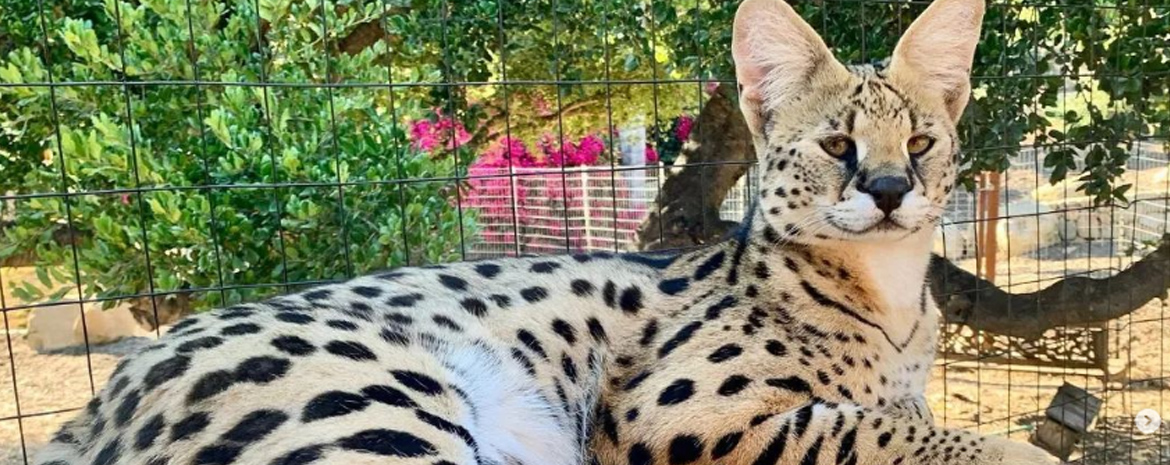Contact
- 04 77 75 22 90
- contact@association-tonga.com
- Tonga Terre d'Accueil,
Espace Zoologique,
42800 SAINT-MARTIN-LA-PLAINE
© Copyright Tonga Terre d'Accueil

Until now, the United States of America was among the most affected by this problem, but France is no longer free from hybrid cats...
The Tonga Terre d'Accueil association joins the fight of sanctuaries and shelters in the USA against the hybridization of cats with wild species such as the Serval or the Caracal. Specific animals, different behaviors, threats to biodiversity, increased traffic... Find out why we totally disapprove of hybridizations.
Specific animals, different behaviors, threats to biodiversity, increased traffic... Find out why we totally disapprove of hybridizations.
A hybrid is an individual resulting from the crossing of two different species. The hybridization that concerns us is that carried out by crossing a wild animal (Serval, Caracal, Geoffroy's cat, Asian leopard cat, etc.) with a domestic cat, to create new breeds such as the Savannah, the Caracat, the Safari...
The Savannah cat is a breed created in the 1980s-1990s in the USA following the crossing of a domestic cat with a Serval. Individuals from the 5th generation from this couple are considered domestic cats and their possession is free. The breed has been authorized by the LOOF (Official Book of Feline Origins) for around fifteen years in France. This desire for exoticism is yet another human exaggeration, created above all to make a profit; the goal being clearly commercial: to offer a large “exotic” cat to satisfy human desires!
The first generations of Savannahs resulting from the cross between a Serval and a domestic cat are prohibited from being kept in France due to being too close to the behavior of the Serval. To say that subsequent generations are domestic is nonsense. Whether it is the dog or the cat, domestication did not take place in a few generations but over more than 4000 years.
The sale of a hybrid breed like the Savannah proves to be much more motivating for breeders than that of classic breed cats: the Savannah sells for between 2,000 and 20,000 euros compared to a few hundred euros for other cat breeds. A primarily for-profit breeding operation whose ethics are very questionable.
BEHAVIOR
Hybrids have behavior that is unsuitable for domestic life. In addition to being very destructive, they instinctively mark their territory to the chagrin of owners who are not always prepared for these odors. It is an animal which behaves wildly, which needs space, numerous stimulations and which, despite its attachment to humans, can have a pronounced character. Putting an animal in a house that needs a space almost similar to that of the serval is absurd.
HEALTH
The cat-Serval cross is a genetic aberration, as can be a lion-tiger cross; individuals have many defects. Proof, if any were needed, that this genetic cocktail is not natural: Savannah males from the first generations are sterile. These individuals, considered useless, can be abandoned, sold or worse. This is also the case for individuals who are not attractive or who do not have an attractive physique, because this crossover is also random.
Savannah cats can have abnormal health problems such as respiratory tract infections, urinary tract diseases, colon disorders...
IMPACT ON BIODIVERSITY
The domestic cat is already doing a lot of damage to local wildlife (birds , reptiles...), the Savannah could have an even greater impact on biodiversity because it is a large cat with an even more developed hunting instinct than that of a domestic cat... It is therefore very risky to spread Serval genes in nature. Added to this is the risk of Servals being taken from the natural environment in order to fuel this growing traffic. Servals traffic of which we only see the visible part, which is all the more worrying.
SERVAL TRAFFIC EXPLODES
Since the end of 2021, our shelter has been called upon every week by the authorities to take care of Servals illegally detained by individuals. Unfortunately, our reception capacity is not infinite and we must refuse to take in animals. The ten Servals entrusted to us in just 6 months are ALL identified as the Savannah breed. Traffickers play on the legality of Savannah to sell pure Servals, although they are prohibited from being kept in France. Traffic can come both from France, but also from abroad. Servals, often young, cross borders without much difficulty due to their resemblance to young Savannahs.
The Caracal is also the subject of worrying trafficking, in particular because of the derived breed (the Caracat), created a few years ago in Russia. Caracat is not authorized in France (a very good thing).
SUBJECT TO DEBATE
Hybrids, particularly the Savannah, are the subject of debate in many countries. The breed is notably banned in Australia for the environmental risk it poses. This country has, in fact, learned from past mistakes with the introduction of the rat, the rabbit, the cat which has completely disrupted the Australian ecosystem and has already made many reptiles and birds disappear. The city of Brussels also banned the Savannah because of its unsuitable behavior for domestic and city life. Britain is considering banning the Savannah due to the risk of exotic animal trafficking.